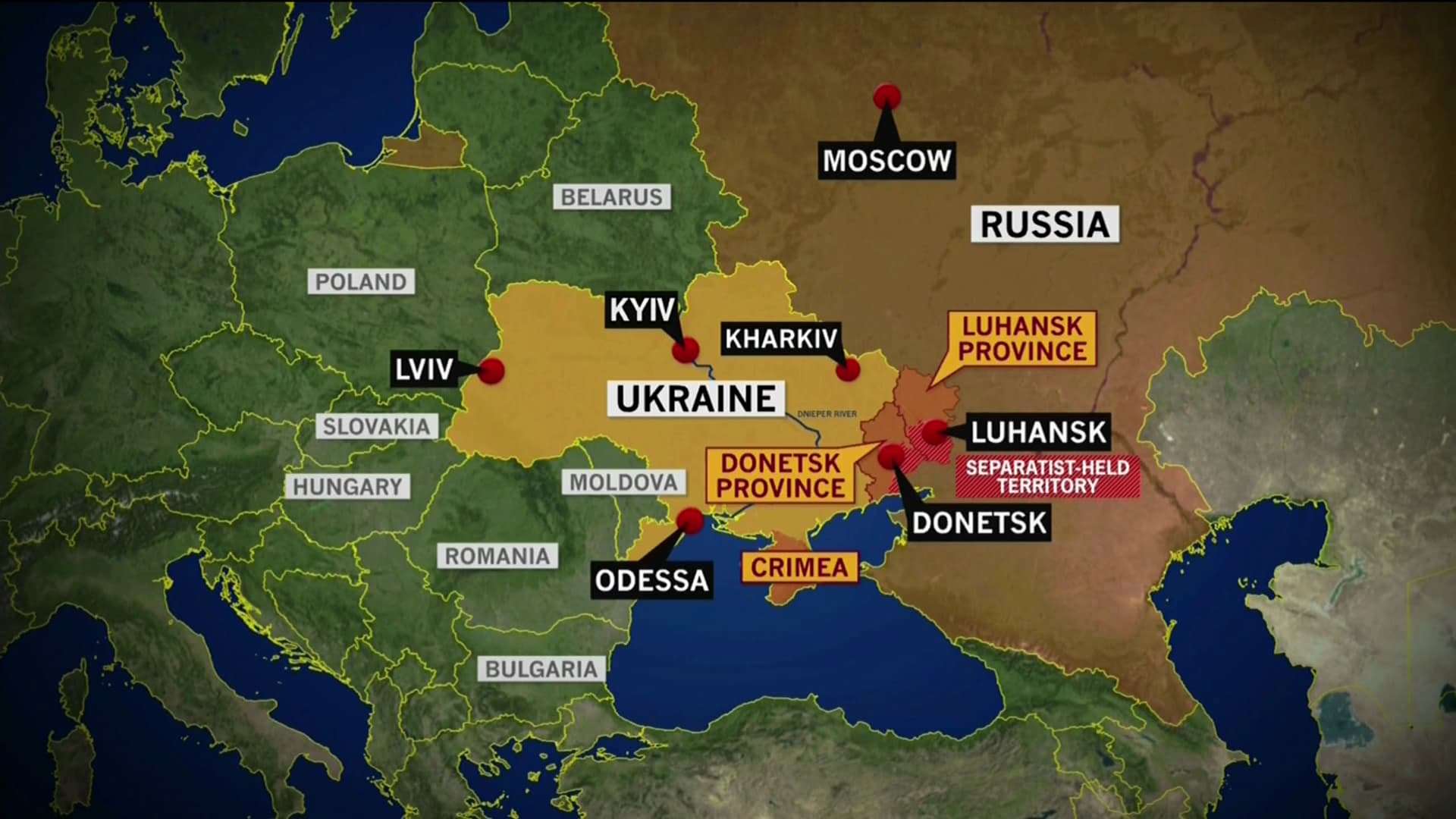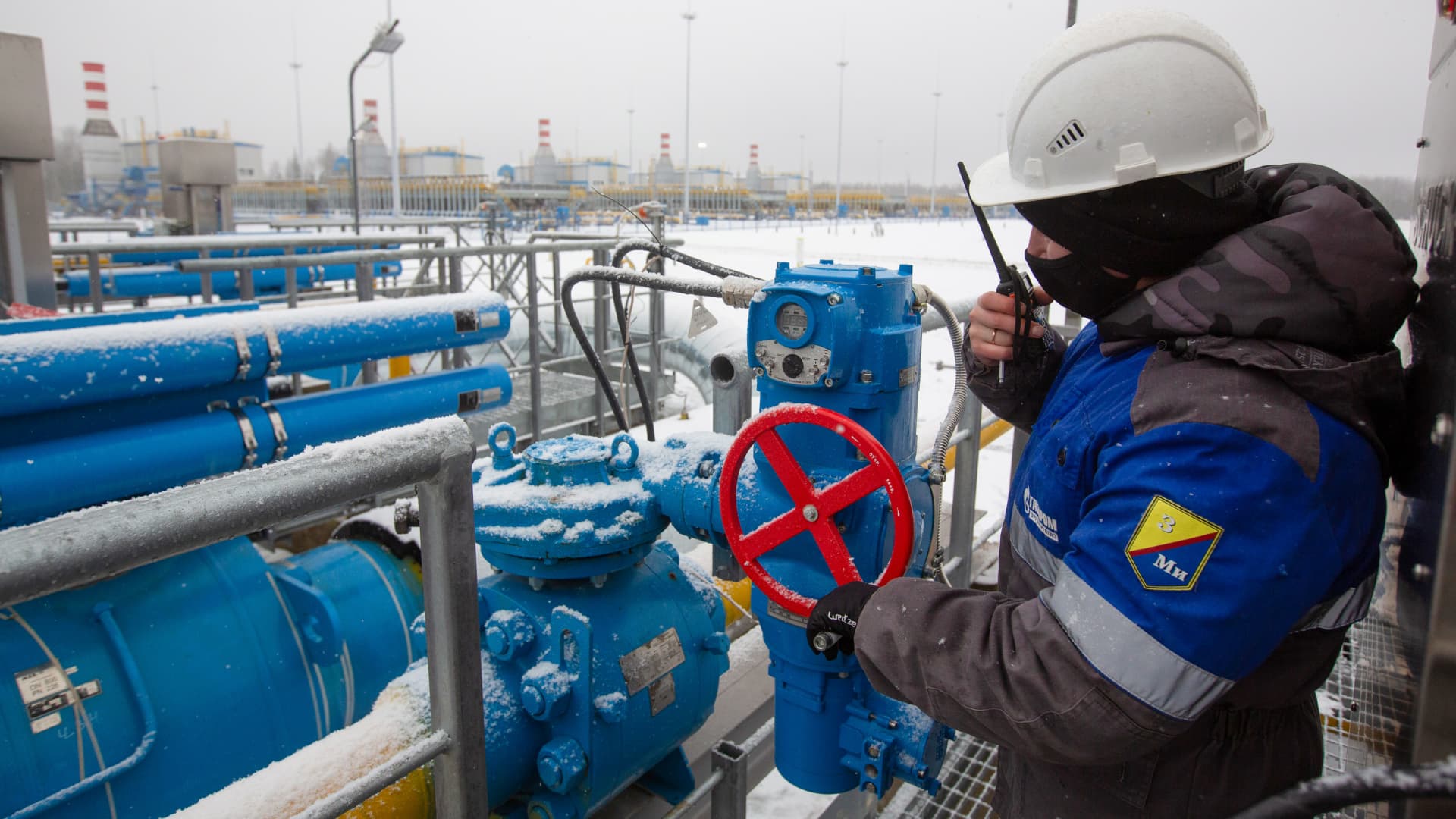
- Russia's invasion of Ukraine represents one of the worst security crises in Europe in decades.
- It is also expected to have far-reaching implications for the global economy, particularly given Russia's role as the world's second-largest producer of natural gas and one of the world's largest oil-producing nations.
- "Sanctions on Russian oil and gas would mean higher energy prices the world over," Troy Vincent, senior market analyst at researcher DTN Markets, told CNBC via email.
Russian forces on Thursday launched their long-feared attack on Ukraine, sending shockwaves through financial markets and ratcheting up fears about the ramifications for gas supplies around the world.
Russian President Vladimir Putin cast aside international condemnation and the first tranche of sanctions by declaring the beginning of a "special military operation" aimed at the "demilitarization" of Ukraine.
Russian forces have reportedly fired missiles at military control centers in Kyiv and sirens were heard throughout the capital. NBC News reporters on the ground also saw and heard explosions in Kyiv and in other cities across the country.
Get top local stories in Southern California delivered to you every morning. Sign up for NBC LA's News Headlines newsletter.
The crisis in Ukraine is changing rapidly and specific reports from the country are difficult to confirm.
Ukrainian Foreign Minister Dmytro Kuleba said via Twitter on Thursday that Putin had "launched a full-scale invasion," of the country, which he described as "a war of aggression." Kuleba called on world leaders to stop the Russian president. "The time to act is now," he said.
European gas prices jumped on news of the invasion, while international benchmark Brent crude futures surpassed $100 a barrel for the first time since 2014.
Money Report
"While Western governments probably will exempt energy transactions from sanctions, the blizzard of new restrictions will force many traders to be exceedingly cautious in handling Russian barrels," analysts at political risk consultancy Eurasia Group said.
"Gas transiting Ukraine will likely be disrupted, affecting supplies to several central and eastern European countries, and raising gas prices in Europe," they added.

The U.S., Canada, Britain, the European Union, Australia and Japan were among the countries to announce the first wave of sanctions against Russia earlier this week, targeting banks and wealthy individuals. A second barrage of measures is widely expected shortly.
Germany also halted a highly contentious gas pipeline project known as Nord Stream 2, prompting a broader rethink about the region's deep dependency on Russian gas.
What if Russia turns off the gas?
Russia's invasion of Ukraine represents one of the worst security crises in Europe in decades. It is also expected to have far-reaching implications for the global economy, particularly given Russia's role as the world's second-largest producer of natural gas and one of the world's largest oil-producing nations.
For several months, Russia has been accused of intentionally disrupting gas supplies to leverage its role as a major energy supplier to Europe amid an escalating dispute with Ukraine.
Indeed, this was even the subject of a rare public rebuke from the International Energy Agency, which called on Russia to increase gas availability to Europe and ensure storage levels were filled to adequate levels during a period of high winter demand.
The Kremlin has repeatedly disputed claims that it is using gas as a geopolitical weapon, with state-owned Gazprom saying it has fulfilled its contractual obligations to customers.
Now, energy analysts are deeply concerned about the risk of a full supply disruption to the EU — which receives roughly 40% of its gas via Russian pipelines, several of which run through Ukraine.
If Russia cut off its gas supplies, there would likely be profound public health and economic consequences, particularly as such a scenario could come during winter and amid the coronavirus pandemic.
Analysts at Wood Mackenzie said Europe can satisfy gas demand for now and is currently in a better position than it was at the start of winter. The longer-term outlook, however, is more uncertain.
Kateryna Filippenko, principal analyst for Europe gas research at Wood Mackenzie, said "things could obviously get a lot worse" if Russian exports to Europe were disrupted.
"It [Europe] would have to pull every lever in the energy system to keep the lights on – reducing gas burn and cranking up mothballed nuclear and coal plants; maximising indigenous gas production and pipeline imports; persuading Asian buyers to use coal and free up LNG," Filippenko said, noting that even this would only be a temporary solution.

"If all Russian gas is cut off, Europe would have no chance of coping," Filippenko said. "Were all gas flows to stop today, Europe could well muddle through in the short term, given higher storage inventories and low summer demand."
She added: "But in the event of prolonged disruption, gas inventory couldn't be rebuilt through the summer. We'd be facing a catastrophic situation of gas storage being close to zero for next winter. Prices would be sky high. Industries would need to shut down. Inflation would spiral. The European energy crisis could very well trigger a global recession."
China's unique position
Troy Vincent, senior market analyst at researcher DTN Markets, told CNBC via email that "there are simply no alternatives" to Russian volumes of oil and gas "that do not entail far higher prices and potentially the development of severe shortages."
"With this in mind, it's clear to see how sanctioning Russian energy exports to both Europe and the rest of the world would mean mutually ensured destruction of economic growth and government budgets," he said.
"Sanctions on Russian oil and gas would mean higher energy prices the world over," Vincent said, but noted that China's pipeline infrastructure linking it with Russia and Beijing's willingness to ignore U.S. sanctions put the country in a unique position.
"China is likely the only major nation globally that could benefit from such sanctions, as they would likely increasingly soak up discounted Russian volumes," Vincent said.
Stewart Glickman, energy equity analyst at CFRA, said in a research note on Wednesday that he expected sanctions of Russia to have "fairly significant consequences" for energy markets.
A huge supplier of natural gas to Europe, Glickman noted that Russia is also a massive producer of fossil fuels and among the top three in terms of crude production.
With that in mind, Glickman said: "Cutting off the spigot would, in our opinion, cause pain in all directions – both to Russia, since its national budget is fairly reliant on commodity exports, and to buyers, since fossil fuel demand would still be high and likely result in higher pricing from other suppliers."






